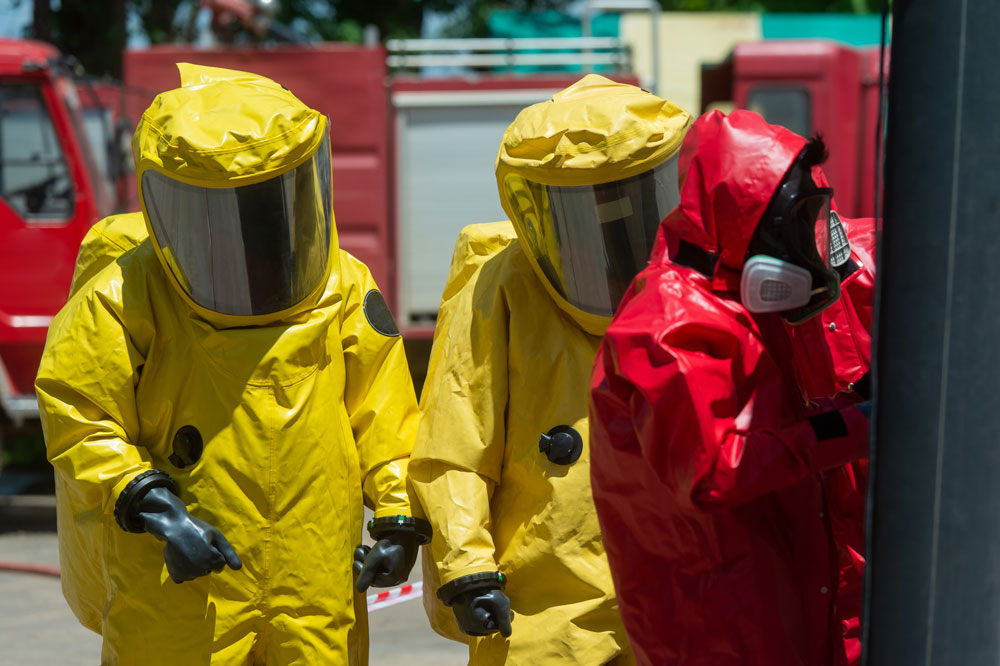Most Common Types Of Hazardous Substances

CONTENTS
Hazardous substance are widely used in industries across the country, and the use of them is governed by the Control of Substances Hazardous to Health Regulations 2002 (COSHH).
Caution must be taken when handling any of these substances, as they can be detrimental to both human health and the environment. In the event a spillage occurs, it must be dealt with promptly.
At ICE Cleaning, we use the latest technologies when conducting hazardous waste cleaning services. Our technicians utilise their expertise and skill to deliver fantastic results for our customers, no matter the type or form of the spill.
If you've ever wondered what substances are classed as hazardous, look no further. We have compiled a blog with some of the most common hazardous materials you can come across. Read on to discover more.
Biological agents
Many risks are associated with exposure to biological agents, such as allergic reactions and lung damage. In extreme circumstances, death could result.
Examples of these agents include parasites, bacteria and viruses. We have all become very familiar with particular biological agents in recent years, such as the Coronavirus.
Other viruses include the Zika virus and Legionnaire's disease. For more information on health implications of biohazards, take a look at this article written by the Health & Safety Executive (HSE).
If you work in an environment where you could come into contact with biological agents, it is vital that you are equipped with the necessary personal and respiratory protective equipment.
Employers should provide rigorous training for anyone tasked with handling biological agents, as the risks are numerous. This will help to keep staff safe during working hours.
Gasoline
Used to power motors and other equipment around the world, gasoline is one of the most recognisable hazardous substances. It can cause various health effects, including lung damage, dizziness, and in serious cases, cancer.
As well as this, gasoline is extremely flammable. The consequences of mishandling the substance can be devastating, so careful management of the oil is always needed.
Anything that could spark a fire, such as a lighter, should be kept clear of gasoline. The substance itself should also be secured in a well-ventilated location.
It is essential to act cautiously when dealing with gasoline, even its residue. Additionally, all vessels storing gasoline must be labelled as hazard to protect the safety of everyone in the vicinity.
At ICE Cleaning, we are fully qualified to dispose of hazardous waste. We can arrive within an hour in emergencies to carry out any hazardous waste cleaning you need, working diligently to return your site to a safe condition.
To read more about the health and safety practices we follow as a hazardous waste cleaning company, click here.
Batteries
Batteries are another hazardous substance you should be aware of, and one you are likely to come across in your everyday life. Lithium, cadmium, lead and nickel are some of the main components in batteries that can make them hazardous.
Used to power household devices from television remotes to laptop computers, batteries can cause danger to the environment and to human health if not disposed of properly.
Another risk present from explosions, as batteries are a prominent fire risk. To throw your batteries away, there are a few options available to you. Many supermarkets nowadays offer battery recycling points, or you can find out how to recycle them through your local council.
It is important to be aware of the hazards posed by batteries, as they play an important role in a whole host of electrical equipment used daily.
Disinfectants
Disinfectants contain varying substances harmful to human health. For instance, formaldehyde can result in respiratory irritation, while detergents may cause skin, respiratory and eye irritation.
Exposure to disinfectants often comes in the form of contact with skin or via inhalation. When using disinfectants, it is important to take all the required precautions to safeguard your health.
Utilised to stop infection, disinfectants are an important part of many cleaning processes. In the event you need a strong decontamination, disinfection or sanitisation service, we can help.
We offer a complimentary application of our innovative ICE SHIELD® treatment, which is applied following cleaning. It works by combining electrostatic technology with a persistent solution, assisting in protecting against harmful bacteria and viruses for up to 28 days.
Solvents
Solvents are used in different industries to dissolve or dilute substances, for things such as de-greasing and lubricants.
Frequently combined with other matter, health concerns from solvents can occur from inhalation, swallowing, or absorption. This might cause skin irritation, nausea and dizziness, to name a few symptoms.
There are many precautions employers who work with solvents must taken, such as training their staff and providing them with the correct equipment.
We're here to help
Wherever you're based in the UK, we're on hand to help. With years of experience in hazardous waste clean-up, our experts will be able to treat the issue in a time-efficient manner.
Get in touch today on 0208 066 0360 to find out more. Alternatively, you can contact us at enquiries@icecleaning.co.uk.

Speak with me today,
I’m here to help
By asking you a few questions either via phone or email I can immediately provide a realistic estimation of the cost.
You’re in good company. We’ve cleaned for the following commercial clients… View all

Why choose us?
- Cater to a wide variety of cleaning situations
- Nationwide coverage, available 24/7
- Cater to commercial and domestic clients
- Free survey provided prior to quotation
- Emergency response team
- Offer a bespoke service designed to suit all your needs
- All technicians hold professional health and safety qualifications, including BICSc, IOSH, Dewpoint Professional & Safe Contractor
We’re fully accredited
We place best practise, professional expertise and health and safety at the core of our business. We’re fully compliant with all legal obligations. You can view a list of our accreditations below, or visit our Health & Safety page for more information.











-RGB-small.1707319151.jpg)




















